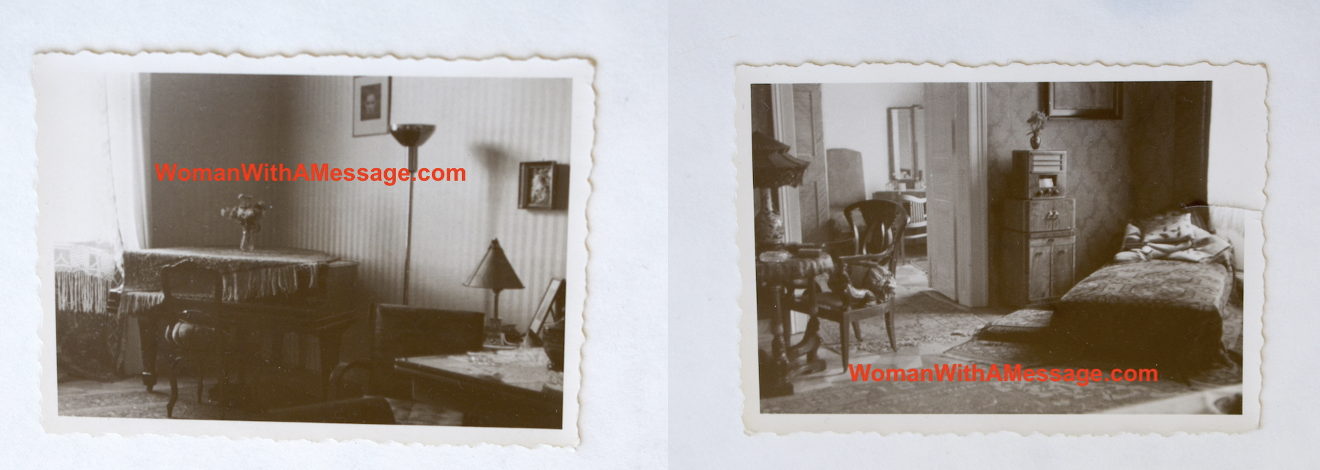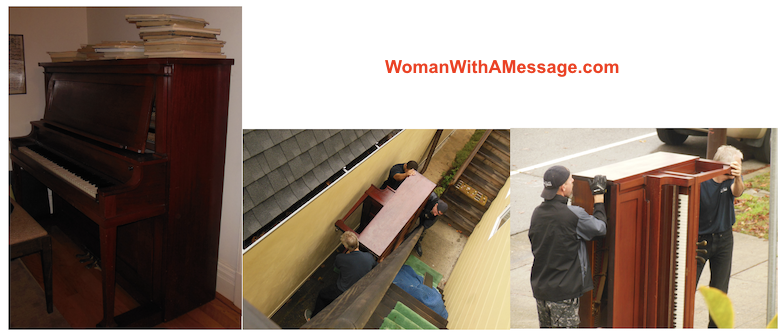Galata, Pera, Istanbul, Moda, Burgaz, Balat, Fener-Bahge-Kadıköy, February 1, 1946
My dear sweet boy for whom I’ve been so afraid…I found out [that you were in the army in the South Pacific] at the same time as the very happy news of Eva’s marriage. Harry-boy, I must have become an abnormal or degenerate mother in my time in the camp, because I needed weeks to get used to the thought that my daughter, my little Ebi, is a woman…. Was it egoism that I didn’t want to admit this to myself and didn’t want to perceive or believe that Eva doesn’t belong to just me anymore? Was it wounded vanity that hurt me that Eva chose a spouse without my opinion about her choice or the thought that my daughter, inexperienced in erotic matters, might be disappointed by marriage? ….
That you are in Frisco again I found out before Robert’s communication arrived. I found this out from my friend Lucienne [Simier] from Angers …. She gave me the news that Eva was married and that you are a soldier and are hanging around in San Francisco. … [Lucienne managed to smuggle out in her glass case addresses Helene had written down] I had scribbled Eva’s address – of course it was still the one from nursing school – and Tillie’s address. All the other addresses I had forgotten. Isn’t that wonderful? I think that it’s wonderful that Miss Simier in this way could establish contact, not that I had forgotten all the other addresses. There is certainly nothing wonderful about that. Maybe an SS fist “caressed” me just in that part of my brain where I keep my card catalog where the most important names and addresses to me were stockpiled, while I could still remember all the telephone numbers of people and companies who don’t exist anymore in my head.
You wanted my exact address? You’ll have to make do with the Gislavet Ltd [Yomtov Cohen’s plastics company], because since my arrival in Galata on the 10th of April, I have lived in all the districts that I listed up on top of the letter. …
I have just as much to eat here as I did not have in Germany in the camp, and I have here just as little money as I had an excessive amount of body lice in the camp. I managed to get a dust comb sent to me from Vienna, and that saved me from having head lice unlike most of the others and I still more or less have my hair which has now become a rather shabby head covering. I don’t have all of it anymore, but I’ve got some.
The last place I stayed in Istanbul has the highfalutin name of Bark-Oteli, a former nun’s cloister. In my room, there was a window made of stained glass which reminds me that in the next room where now there are men who appear to be cheating at cards and having wild brawls and orgies, at one point that was used for fervent prayer. …
Moldy, cold air is what you find in these rooms. I feel like I’m lying in a tomb. The first nights my teeth were chattering and I had two dust-covered but not warm coverings and I couldn’t sleep. The bare, cold walls seem to be saturated with the … unheard prayers and sighs of my predecessors, the nuns. …Maybe someday my groans and moans will bother the people who come here to sleep after I do in the same way as the moans of the nuns have been conserved here. But no, this will not be the case, because this cloister building which is in the middle of a splendid park is going to be renovated into a hotel …. A Jewish committee will be paying a fortune for this. …
This park must be quite splendid in the summer, because it’s right on the Marmara Sea, even though it’s quite squalid currently. The garden, which is surrounded by a brick wall, has cypresses and pine trees. In front of my window there are laurel trees from which when I have kitchen duties (twice a week) I can get bay leaves for a spice for our meat and fish dishes. I can also get rosemary. There is a splendid spinach growing, not in the plant beds, but it grows wild on the lawn and … I have learned that one can make a good dish from malva leaves. On every day when we don’t have rain, I use that time to go pluck chamomile and thyme which is good for the people living here, but not really my main duty. For me it’s relaxing.
The radio, newspapers, and movies were what I used to seek for relaxation before I was put down to the level of an animal. Here I have found a few nice people and good books. Unfortunately, moving from one shelter to another happens lightning fast. Only twice did I have a chance to make a phone call, and the distance from one part of the city to one of the islands or far-flung suburbs especially in winter is quite large because the ship traffic is quite reduced. I was visited in Moda but I already lived in Antigone, in Borgaz. … The time involved is quite a sacrifice, aside from the fact that the travel costs play quite a significant role for the relatives we have, who are mostly not that well off.
Yesterday I discovered hiding under some ivy what is probably the grave of a monk. Why not, since this was in fact a cloister for nuns? The garden has sort of a terraced structure. There are steps made of marble which lead from one terrace to the next and in the marble crosses and Greek inscriptions are engraved. I just read Axel Munthe’s [Swedish doctor and psychiatrist] book “The History of San Michele” and I feel like I’ve been sent back to this time. The blue sea with the snow-covered mountains, even in the summer, flutter in but they seem more like Carinthia [a province in southernmost Austria] than the Mediterranean landscape. A garden in our area could have stood as the model for Böcklin’s painting Isle of the Dead.
It really might be splendid here if my head were ready to accept all this beauty, but so much that is in there is not beautiful and is sending everything else away, making it impossible to find the beauty in the beauty. My ability to be enthusiastic ended with losing Vitali, but as soon as I hear from him, and we will hear from him that he is alive, then this feeling will come back. I thought he might be in Vienna, but I have read some articles about Vienna which make me believe that Papa is somewhere else, maybe still in a camp or a hospital, maybe staying there. He has no idea that I am in Turkey, nor does he know how to get in touch with me, even if he did know I was here.
For the last two months my main support has been Robert. I always knew that he was a sentimental and emotional boy, but I did not know that he would show so much loyalty, devotion, sympathy, and love…. Unfortunately, I have not heard anything, I haven’t received even one line of writing from you, from Paul, Tillie, Hilda, or Berthe Schiller. It was so sad to see that all the comrades in suffering and fate were getting letters from all over the world, but not me. The kindest person must be jealous, and I have never thought of myself among the kindest. I have become tired. I am not used to writing anymore. Please kiss Eva, her husband, Paul, and all the loved ones for me and a hug from me….
Greetings and kisses from
Helene
































